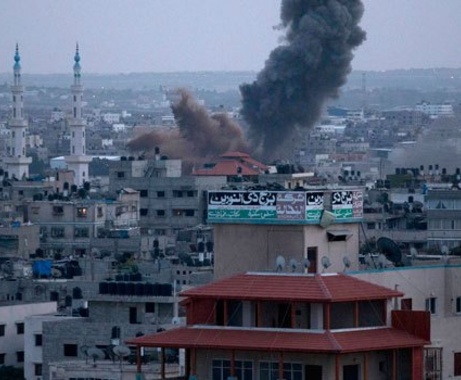
GAZA.
FOLLOWING the main camel route leading
from Palestine down to Egypt, the traveler comes, near the confines of the Holy Land, to a city lying partly in ruins.
This is Gaza, one of the oldest cities in the land, having been built before Abraham's time. It stands on a low sand ridge some three miles from the sea, and extends over more ground than that part of Jerusalem inside the city walls. From its position on the main road it has ever been a city of the highest military importance, for, unless this stronghold was taken, the way from Palestine into Egypt or from Egypt to the north was completely obstructed.
In the division of the land among the Israelites, Gaza fell to the lot of Judah, who took the city, but did not expel the inhabitants. We hear of it again, when the champion of Israel, tarrying over night within its walls, arose at midnight, and—
"By main force pulled up and on his shoulders bore The gates of Gaza, post, and massy bar, Up to the hill of Hebron, seat of giants old."
Afterward, proving recreant to the trust God gave him, Samson was led—
"To grind in brazen fetters under task,
Eyeless in Gaza, at the mill with slaves."
But he avenged his wrongs. When the Philistines, at one of their festivals, brought him in to make sport for them, all the wrongs committed against him and his people rushed through his mind, and, praying God to give him his former strength, he laid hold of the main pillars that supported the flat roof, and "bowed himself with all his might; and the house fell upon the lords and upon all the people that were therein. So the dead, which he slew at his death were more than they, which he slew in his life."
Although the prophecies against Gaza have not been so terrible as those pronounced against some other cities of Palestine, they have nevertheless been literally fulfilled. When Alexander set out on his tour of conquering the world, he found 'Gaza in his way on the march to Egypt. He accordingly laid siege to the city, which for five months bravely resisted him. Exasperated because it held out so long, he at length took it by storm, and treated the inhabitants to the most barbarous cruelties, murdering all the warriors, and selling the women and children into slavery. He repeopled the city with those who dwelt in the country around, and then proceeded on his march toward the south.
Gaza has several times since been destroyed, but has always been rebuilt.
The present town, of some fifteen or sixteen thousand inhabitants, resembles a cluster of large villages. The principal one stands on the top of the sand ridge, while the others lie at its base in the plain below. Our picture gives a near view of the town. Many of the buildings are already crumbling away, and the whole city has an air of decay, due, perhaps, to the fact that the houses are built of the stones used in the ancient city. The chief trade is in soap, which is carried by the Arabs over the desert to Cairo. The modern town has no walls or fortifications of any kind, yet the inhabitants remain unmolested, as they stand in friendly relations to the Arabs.
Efforts have been made to introduce Christianity into Gaza as well as into other cities of Palestine, and this stronghold of idolatry now has three Protestant schools, where the good news of salvation is told to all who will hear.
W. E. L.